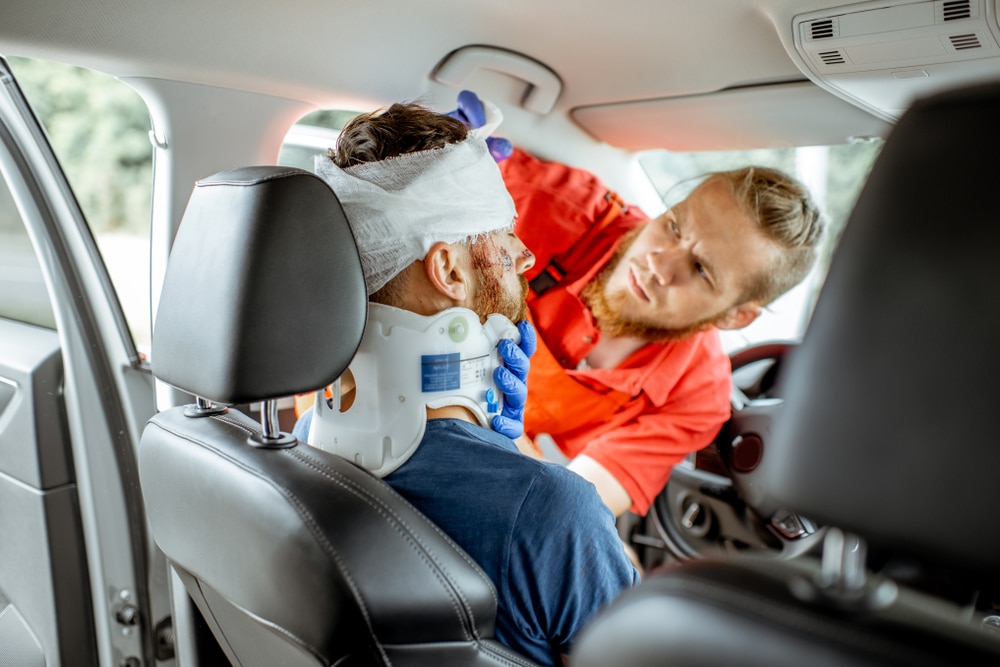Call No-Fault Doctors at (888) 970-5065 for quality care when you sustain a head injury after a motor vehicle accident.
The National Library of Medicine notes that 1.7 million Americans suffer from a traumatic brain injury (TBI). However, most sports or recreation-related head injuries never see an emergency room or healthcare facility. The person could suffer from a mild TBI and never see a doctor despite having TBI symptoms.
Similarly, a car accident can lead to various injuries all over a person’s body. Since some head injury symptoms can seem related to other injuries, people may miss them even after a car accident. Similar to a sports-related TBI, car-related injuries may not always appear immediately after the accident.
To ensure you receive proper post-accident care, you may need to visit an auto accident neurologist in New York. A neurologist specializing in traumatic brain injury has the expert knowledge to assist with potential problems. Here, we list a few symptoms to look out for and your next steps to receiving high-quality medical care.
Major Head Injuries Requiring an Auto Injury Doctor in New York
Many people have heard of a concussion, though they may not know what it entails. Additionally, the CDC reports that people often fail to get treatment for TBIs despite around 64,362 TBI-related deaths occurring in 2020. One contributing factor to this number is people not knowing the kinds and signs of a TBI.
Concussion
The brain floats in fluid, protected by thick walls of bone. Concussions occur when enough force acts on the head or neck that the brain knocks against the skull, damaging the brain cells.
A single concussion from a relatively light impact may not cause a severe injury. However, severe TBIs can happen from car crashes, impact sports, getting shot, and more. Repeated concussions can also make a mild TBI more severe.
Edema
An edema is swelling as the result of fluid retention. These can occur around the body, like the hands or feet. However, edemas become especially dangerous when they happen in the brain after a closed head injury.
Consider a concussion, where the brain hitting the skull wall leads to temporary damage after a single instance. With edemas, the brain swells in the skull, and closed head injuries don’t allow the brain to expand. Brain cells can die after extended periods under pressure, leading to more severe symptoms.
Skull Fractures
Inaccurate internet information indicates that the skull does not have bone marrow. However, doctors have disproved this, and a Harvard study found that the skull’s bone marrow assists with brain protection.
Regardless, a skull cracks when it cannot absorb all the force it keeps away from your brain. A cracked or fractured cranium cannot distribute additional energy properly, which can affect brain cells. Skull fragments can also press into the brain, causing further injury.
Blood-Brain Issues
Hematomas are blood clots outside the blood vessels, and a hemorrhage is uncontrolled bleeding. Both blood issues can cause pressure to build in the brain and skull.
Subarachnoid or intracerebral hemorrhages pertain to brain bleeds. A subarachnoid hemorrhage bleeds around the brain. Meanwhile, an intracerebral hemorrhage bleeds in the brain tissues.
Diffuse Axonal Injury
This silent injury occurs because the connecting nerve fibers in the brain tear as it roughly rotates in the skull. These tears can lead to swelling, a loss of brain function, or even death.
John Hopkins Medicine notes that diffuse axonal injuries, while severe, often may not appear evident during diagnostic testing. As such, a diffuse axonal injury can be the most dangerous head injury from car accidents. It can also occur from other forceful impacts, such as blunt trauma during heavy contact sports.
Major Head Injury Symptoms and Treatment
Instead of searching “auto accident neurologist near me,” you can use our number to receive help finding a no-fault doctor. Additionally, you may require assistance finding a doctor due to the various symptoms of a TBI. These symptoms can prevent normal daily activities and functions, ranging from mild to severe reactions:
- Headaches
- Lightheadedness
- Mild confusion
- Nausea
- Temporary tinnitus (ringing in your ears)
- Blurred vision
- Sensations of spinning
- A persistent or worsening headache
- Vomiting
- Coordination or balance issues
- Serious disorientation
- Abnormal eye movements
- Inability to focus the eyes
- Muscle control loss
- Memory loss
- Mood changes
- Leaking clear fluid from the ears or nose
- Seizures
- Loss of consciousness
Although the NIH notes that 80% of all TBI cases constitute mild head injuries, all symptoms require medical assistance. If you do not go immediately, please check in with the emergency room within two days following the accident.
From there, a neurologist specializing in traumatic brain injury can evaluate you post-accident. Some tests and scans measure your brain activity, while others review your reaction time to stimuli, mental processing, or memory.
If they determine that you have a TBI and discover its severity, doctors typically follow one of three treatment plans:
- They provide emergency medical treatment for moderate to severe head injuries. This process may include ensuring you maintain proper oxygen and blood levels.
- Mild to moderate TBIs may prompt general pain management and monitoring. While they stay watchful for any possible turns in severity, doctors also intend to treat current pain symptoms. They may suggest reducing bright lights, ceasing certain activities for a period, or may prescribe over-the-counter painkillers.
- Long-lasting TBI symptoms may require neuro-cognitive therapy. This therapy helps people regain cognitive function or manage cognitive impairments.
How to Contact the Best Neurologists Specializing in TBI

Suffering a head injury from car accidents is a frustrating and often overwhelming experience. At No-Fault Doctors, we strive to help people find the care they need.
Doctors in our directory accept most insurance plans, including workers’ compensation, no-fault, and Personal Injury Protection (PIP). Some neurologists may have same-day appointments available.
Save yourself the trouble of searching “auto accident neurologist near me” online by calling us at (888) 970-5065 to find a New York or New Jersey medical provider for quick and effective treatment planning.
How long after head injury do symptoms occur? Read our blog.
